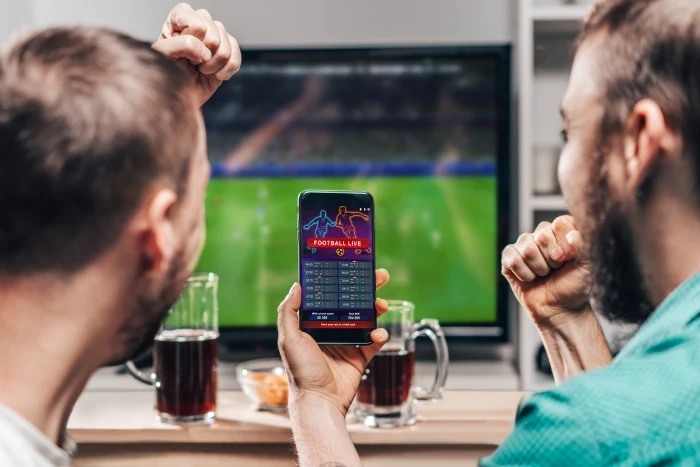The psychology of sports betting is a fascinating topic that reveals valuable insights into human behaviour. Understanding what goes on under the hood is crucial. It informs us of the exact ways in which emotions, cognitive biases, and external influences shape betting choices.
Ultimately, learning about the psychology of betting leads to a more responsible gambling environment but can also help bettors improve their strategies.
Why Do People Bet?
Uncovering the mystery behind why people bet is not an easy task; there’s no one answer to this conundrum. The entire scientific field of betting psychology is dedicated to studying gambling behaviour to pinpoint what draws people to games of chance. However, the factors below seem to be key in driving people to bet.
Entertainment
For sports enthusiasts, watching the game is an interesting activity in itself. Add to it the thrill of placing a wager on the outcome, and the excitement doubles. The unpredictability and the potential winning are what make this activity so appealing to many.
Cognitive Challenge
Some bettors simply like the mental stimulation of making the right call. After all, betting is not a mechanical act you make at random. You have to possess a deep knowledge of the sport and then analyze the odds and statistics. Furthermore, you should keep up with the relevant news and factors – the participants’ health, team formation, home turf advantage, etc.
Even going with your gut requires a certain degree of knowledge and experience. The psychology of sports betting is clear that this mental challenge is one of the key attractions for bettors.
Financial Incentives
For some bettors, the primary motivation behind placing bets is simply the prospect of winning prizes. However, betting should never be considered a reliable source of income. It’s crucial for bettors to understand the risks involved. So, they should engage in betting responsibly.
The Social Aspect
From the bleachers of a greyhound race in the 19th century all the way to the chatroom of a virtual casino today, gambling has always been a source of social interaction for many. Many bettors like social betting. It allows them to engage with others and compare results.

Psychological Traps, Biases and Fallacies in Sports Betting
The psychology of sports betting involves various traps, biases, and fallacies that can influence a bettor’s behaviour. These mental shortcuts and errors in judgment can lead to irrational decisions. They can influence how individuals place bets and manage their gambling activities.
Psychological traps such as overconfidence, biases like recency bias, and fallacies like the sports betting fallacy (or the gambler’s fallacy) can cause bettors to make poor choices.
The Gambler’s Fallacy
The gambler’s fallacy is the mistaken belief that past events influence future outcomes, such as thinking a losing streak must end soon. In sports betting, this can lead to irrational decisions.
While sports betting statistics are valuable, they should be used rationally, not blindly. Bettors must analyze statistics within the context of current data, considering factors like team performance and player injuries. By avoiding the gambler’s fallacy and employing an analytical approach, bettors can make more informed decisions.
The Hot Hands Fallacy
Let’s remember the 2008 NCAA basketball tournament and Stephen Curry’s remarkable performance. With a series of exceptional shots, he led Davidson College to victory, but was his success a product of skill, pure luck, or was he just ‘’in the zone’’?
Many sports fans believe the latter. This belief that a person who has experienced success in random events is more likely to continue experiencing success is called the hot hands fallacy.
Similar to the gambler’s fallacy, where bettors believe a losing streak will end soon, the hot hands fallacy is rooted in misconceptions about probability. This fallacy is very common in sports betting and confirmation bias is at the root of it. Players seek information that confirms their preexisting beliefs and ignore contradictory evidence.
The Sunk Cost Fallacy
The sunk cost fallacy is a common occurrence in life. When we devote time, effort, and money to projects, hobbies, or assets, it becomes difficult to leave those things behind. Even if the logical thing to do is to admit loss and just salvage what we can, we become too mentally invested to back off.
In sports betting, this fallacy manifests when bettors keep placing bets to recoup their losses. Unlike the hot hands fallacy, where bettors irrationally believe in a winning streak, the sunk cost fallacy compels them to persist in betting due to previous losses.
An example of the sunk cost fallacy in sports betting can be seen when a bettor has already lost a significant amount of money during a betting session. Instead of accepting the loss and stopping, the bettor might decide to place even larger bets. This decision is driven by the emotional weight of the lost investment rather than a rational assessment of the situation.
Availability Heuristic
Moving on to the availability heuristic, which is a state of mind that causes us to jump to conclusions because of the information that is readily available in our minds. In a way, if we observe something and immediately make a connection with what that could be. At the same time, we might ignore other relevant factors that point to the contrary.
In sports betting, bettors might fall into the trap of relying on their own power to recall information and base their betting decisions on that. This can lead to skewed perceptions and irrational bets.
For example, a bettor might remember a recent game where an underdog team made an unexpected comeback and won against a stronger opponent. This vivid memory might lead them to overestimate the likelihood of underdogs winning in future games. It causes them to place bets on similar outcomes without considering more comprehensive data and statistics.
The Anchoring Effect
The anchoring effect is used to describe the state in which a person makes future decisions based on a single, usually first, information they receive. This type of sports betting bias leads bettors to make decisions based on readily available information rather than thorough research.
For example, if a bettor hears a team is favoured to win, they might base their bet on this initial impression, even if later information suggests otherwise. Needless to say, this uncritical reliance anchor can result in poor betting choices and even poorer outcomes.

Emotional Betting
As its name suggests, emotional betting occurs when bettors make decisions based on their emotions rather than rational analysis and objective data.
This often happens in the heat of the moment. Such as after a significant win or loss, leading to chasing losses and impulsive bets. The psychology of betting reveals that such emotionally charged decisions can lead to a cycle of poor judgment and escalating financial losses.
The consequences of emotional betting can be severe, leading to potentially problematic gambling behaviour. To avoid emotional betting, bettors should establish and adhere to a clear strategy. Also, they should set strict limits on their betting activities.
This includes taking breaks after wins or losses and avoiding betting under the influence of strong emotions. It also encompasses focusing on long-term goals rather than short-term outcomes.
Risk Perception in Sports Betting
Some bettors approach risk carefully. These bettors employ strict risk management in sports betting strategies and make decisions based on thorough research and analysis.
They are aware of the inherent uncertainties in sports betting and aim to minimize potential losses by setting limits and diversifying their bets. Their cautious approach helps them manage their bankroll effectively and avoid the pitfalls of impulsive betting.
On the other hand, other bettors tend to overestimate the likelihood of certain outcomes. This misperception can lead to overconfidence, and then to excessive risks, or alternatively, to risk aversion. The psychological effects of misjudged risk can result in poor decision-making.
The Path to Healthy and Responsible Gaming
Promoting responsible and healthy betting involves implementing effective sports betting strategies and utilizing various tools to ensure safe gaming experiences. Here are some key practices:
- Self-exclusion programs. These programs allow bettors to exclude themselves from betting platforms for a specified period.
- Time limits. Players can set limits on the amount of time they spend on betting platforms.
- Deposit limits. Restrict the amount of money that can be deposited within a certain timeframe to prevent overspending.
- Bankroll management. Practices such as setting a budget and tracking your bets can give you a good overview of how much you spend. It also makes you more in control of your transactions.
- Safe betting strategies. You should bet on sports that you’re knowledgeable about. Also, make sure to avoid the pitfalls of emotional betting.
- Take regular breaks. Make sure to pause gambling in regular intervals or, even better, plan your gambling time in advance.
- Seek support. If you feel like your gambling habit is getting unmanageable, talk to a trusted friend or seek professional counsel.

Further Reading and Resources
If you’re interested in the psychology of sports betting and wish to learn about it in more depth, here are some useful resources that you can turn to.
- Thinking, Fast and Slow by Daniel Kahneman
- The Logic of Sports Betting by Ed Miller and Matthew Davidow
- The Business of Betting Podcast
For more specific topics and in-depth research, consider reaching out to communities and forums dedicated to the study of sports betting psychology. For example, you can visit the Society for the Study of Gambling and the International Center for Responsible Gaming.
Psychology of Sports Betting – Conclusion
The sports betting psychology offers a thorough insight into human behaviour and what motivates us to try out games of chance. It examines cognitive biases and emotional traps that lead to typical gambling pitfalls. It also provides a guidepoint for responsible gambling strategies.
Staying informed, using reliable resources, and participating in communities focused on sports betting research can further enhance one’s betting experience and promote responsible behaviour.
Psychology of Sports Betting FAQ
Lastly, take a look at some frequently asked questions concerning the psychology of sports betting.
What psychological factors influence the way we bet?
Cognitive biases such as the hot hands fallacy, gambler’s fallacy, and anchoring effect can lead to irrational betting decisions. Emotional states like overconfidence or frustration also impact betting behaviour, often resulting in poor decision-making and increased risk-taking.
What are the most common reasons people bet?
The most common reason that people bet is due to the thrill of the game. But there could also be other reasons.
What is the illusion of control in sports betting?
It is the belief that one can influence or predict the outcome of bets through skill or knowledge despite the inherent randomness. This cognitive bias can lead bettors to overestimate their abilities and take unnecessary risks.
What is the ostrich effect in sports betting?
The ostrich effect in sports betting is a betting bias. In this situation, individuals avoid looking at negative information or their losses to escape discomfort.
What are the different types of bettors?
Bettors can be categorized into several types based on their motivations and strategies. These can include recreational bettors, professional bettors, social bettors, action bettors, chasing bettors, etc.




